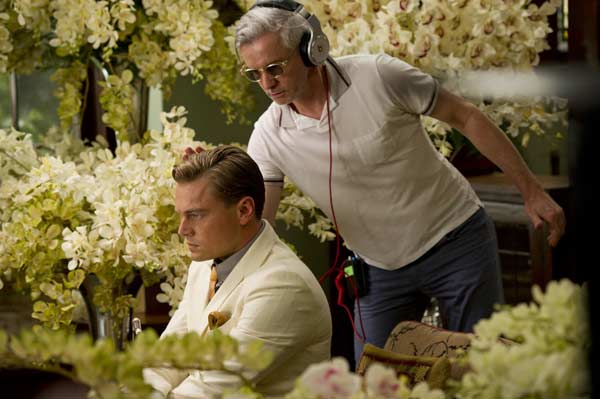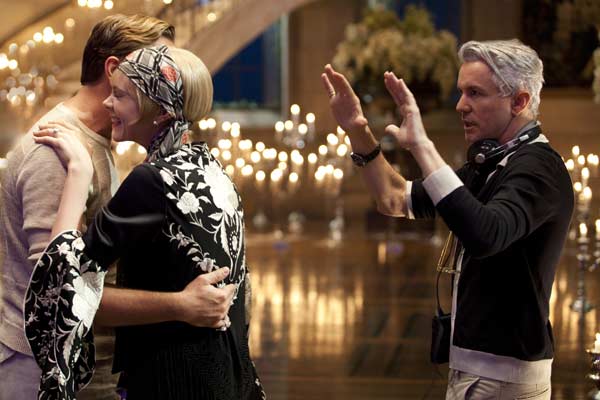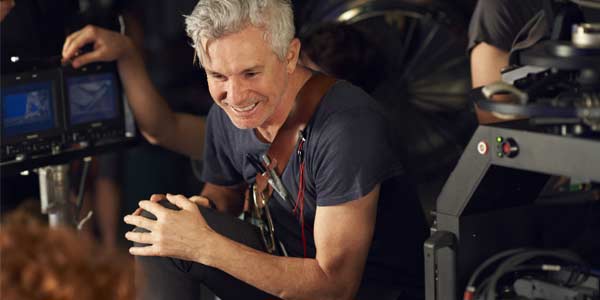In the age of Rotten Tomatoes and Metacritic, sites that aggregate critical reviews and attempt to assign definitive scores to every movie at the multiplex, it seems like the lines between good and bad, adored and reviled, are pretty clear.
Sometimes, though, the audience decides that the critics have got it wrong.
The Great Gatsby is one of those cases. Not a critical darling by any stretch of the imagination, Gatsby — a period romantic drama, not usually the stuff of blockbusters — has taken north of $300 million at the box office, and it's not done yet.
I got director Baz Luhrmann on the phone at his New York home this morning and invited him to take a victory lap.  Hey, Baz, how are you?
Hey, Baz, how are you?
Well, you know, I'm actually pretty good. I've gotten over the whirlwind of Tokyo, which was last week. That was the end of that leg of the whistlestop. It went so well. Haruki Murakami, who wrote Norwegian Wood, translated Gatsby for Japan, and he's like a rock star there. He saw the film and liked it, so then it went all crazy. I've never had a number one film in Japan before; in fact, my films have only ever done well — not great — in Japan. So that was good. And now I'm back in New York with my children, so I'm feeling pretty good!
Did you follow the leadership spill over here last night?
I only just heard about it... I'm sitting in my place in New York, I'm with some of the team from Strictly Ballroom Live, the musical version that I'm doing in Australia next year. The guys said, 'hey, have you heard?' I said, 'no, what?' So, look, you know, I'm as flummoxed as I'm sure the whole nation is.
Basically, it's kind of like Kevin is Gatsby and Daisy is the rest of Australia, and we can all live in Kevin's mansion if we tell Julia we never loved her.
[Laughs] Yeah, well, I'd rather go down to Myrtle's apartment. That's where I'd want to hang.
[Laughs] Sure. Now, Gatsby has just sailed past the $300 million mark. At its core, this is a romantic drama, it's a period piece, it could have been a much smaller thing. But you've willed it into being a blockbuster; you've gotten it under the skin of pop culture. How difficult was that?
Well, Rohan, I think you've languaged it really well. You're right, the version of Gatsby that you could make, that a studio would have made, would be a kind of nostalgic version, and you might have been able to do a $20 million version. You know? Which means you couldn't really do it. I mean, you could, but it would mean that it's not Fitzgerald's novel.
The thing about the Fitzgerald novel, and the genius of Fitzgerald, is that when you read that slender novel, even though it is slender — it's a novella, really — it's epic in emotion and it's epic in ideas. It's epic in its physical execution. You go from wild parties in Long Island to the Valley of Ashes, you know, you go from glamorous New York to North Dakota to Louisville. So, physically, it's epic. Car chases, murders, romance. And then there's this big social climb and this sweeping romance. So, any wonder it's this kind of classic and much revered American novel?
The point is that when I went about doing the movie, I spent two years working with the great academics on Fitzgerald, like Professor James West. He published Trimalchio [an earlier version of The Great Gatsby], and he's also in charge of the Cambridge edition of Fitzgerald. So you're talking heavy hitters. The whole thing we talked about all along the way was that Fitzgerald was a pop culturalist, he was in the moment, he was immediate.
He put African-American street music called jazz in the book, front and centre. People said, 'that's going to be a fad'. He puts popular songs in the book, front and centre. So if I'd just put jazz in it... early on in the script, we said, 'look, let's take the African-American street music of today, hip hop, and let's blend them'. Now that's a choice that is controversial, and we knew it would be. But I had to stick to a philosophy, which is that if Fitzgerald were here right now, would he be interested in making a connection to popular culture in the moment? And the answer, I think, is yes.
Look, all I'm trying to say is, my mission was to translate it into a cinematic experience and make it feel like the book felt when you read it in '25, not as a revered, nostalgic experience. 
Maybe it's because of that pop culture connection, but it seems like audiences have responded to the film much more positively than critics. Do you think that's fair to say?
Well, yes, and I'm used to it. I mean, the critical response to Romeo + Juliet, Moulin Rouge!, Strictly Ballroom, and Australia for that matter, but especially Romeo + Juliet... the critical response to Romeo + Juliet was identical to Gatsby.
Look, I feel for critics, because what I make isn't exactly cookie cutter. So you're sitting there in a screening and you're with some other guy who's maybe 65 or whatever and he's a revered critic, and you're looking at him sideways going, 'what am I supposed to make of this?' I think if you're with an audience... when audiences go and see it, they just go: 'It's my Saturday night. I hope this comes alive, affects me, engages me, moves me.' You know?
I always admired Owen Gleiberman, who's one of the big heavy hitter critics for Entertainment Weekly. A couple of years ago, he put Moulin Rouge! in his top 10 films of the past 10 years. Great honour. Lovely. Except that when the film came out, he totally slated it.
But this is the balls he had, and I'll always admire him for this, he wrote: 'I have never re-written a review in my life, but I'm going to re-write my review of Moulin Rouge! Because I've seen it 10 years later and I realised that I just totally couldn't read what Luhrmann was trying to do. I saw it again on Blu-Ray and I'm making it one of my top 10 films of the last 10 years.' So I'm used to it, is all I'd say. I'm used to that. Look, audiences have made it move past $300 million, and we're not done yet, you know? The audience decides.
What's a shame is when someone's sitting on the fence, and they read a review, and they go, 'ooh, is it all going to be just noise and crazy town video clip stuff for two hours?' And I don't think that's, in any way, an honest description of the film. So that person might miss it in the cinema, and end up seeing it on an aeroplane somewhere. And then they always say, 'oh, I wish I'd seen it at the movies'. You know? So I think audiences should decide for themselves. Which they have, in this case.
Yeah. The way you've interpreted the character of Nick Carroway, there's a lot of Fitzgerald in Nick Carroway...
Yes, and he would say that. Fitzgerald would say that.
If there's a lot of Fitzgerald in Carroway, do you feel like there's a lot of Luhrmann in Gatsby?
It's certainly come up! [Laughs] People have said that about me. Look, I know Jay-Z, and I think we fellows that weren't born into privilege and have imagined a big life and have dreamt with dimension can relate to that character in some regard. I also relate, though, to Nick Carroway, who is a storyteller, and who is a bit within and without. But, I mean, I'm more resolved than Nick Carroway.
But yes, I'm certainly drawn to characters like Gatsby. You know, I came from a very small town and I had big dreams from day one. I wasn't sitting in a small town thinking, 'gee, I'm going to stay here in Herons Creek and maybe run the farm', and then someone stole me away to the circus. No, I ran away to the circus. I ran away to a big life. Even as a young child, I imaged a life not too dissimilar to the one I'm living. So I guess I relate to that, you know?
Yeah. Well, thanks for taking the time to talk.
Thanks, man. Nice to talk to you. It's been a good and interesting chat.
The Great Gatsby is in cinemas now.

